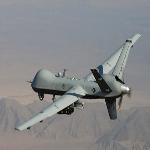06 January 2010

Photo: AP
Undated handout photo provided by U.S. Air Force shows MQ-9 Reaper, armed with GBU-12 Paveway II laser guided munitions and AGM-114 Hellfire missiles
A suicide bomber has struck a military facility in Pakistan-administered Kashmir, killing at least four soldiers and wounding 11 others. This is the second incident in the region within a month, fueling fears Taliban militants are expanding their subversive activities. Meanwhile, tribal sources and local officials say that at least 13 suspected militants were killed and many others wounded in back to back U.S. drone attacks in Northwestern Pakistan near the Afghan border.
The suicide bombing took place near the town of Rawalakot in Pakistani Kashmir. Authorities say the bomber tried to enter an army installation in the area, but detonated the explosives after security guards stopped him for a search at the main gate.
The Taliban and their allied militant organizations have carried out scores of suicide and other terrorist attacks across Pakistan, mostly in the northwest of the country. The violence has claimed hundreds of lives in recent months.
But a deadly suicide attack late last month on a religious gathering of minority Shiite Muslims in Muzafarabad, the capital city of Pakistani Kashmir, and the latest bombing in the region, have fueled concerns the Taliban are expanding their militant activities.
Sardar Attique Khan is the leader of the ruling party, the Muslim Conference, in Kashmir and a former prime minister of the region called the Azad Jammu and Kashmir and known as AJK.
"This is very unfortunate that a second [suicide bombing] incident is taking place in AJK. The basic cause [people think] is that the people [militants] have started shifting from [the] Waziristan [tribal region] and Swat to this area. Azad Kashmir used to be a very peaceful place as compared to other parts of the country. Political tolerance and accommodation and over all religious and political environment is far better than any other part of the country," said Khan.
Pakistani security forces are battling Taliban and al-Qaida militants believed to have bases in the tribal regions known as South and North Waziristan. These areas border Afghanistan and it is widely believed militants trained there are responsible for terrorist attacks in Pakistan and on the Afghan side of the border.
While a full-scale anti-militancy army offensive is underway in South Waziristan, Pakistani authorities are yet to mount a formal action against Afghan and al-Qaida fighters entrenched in North Waziristan. These militants are said to be involved in cross-border attacks in Afghanistan.
The alleged inaction by Pakistan against these fighters is believed to have provoked the U.S missile strikes on suspected targets by unmanned spy planes known as drones.
At least two U.S. missile strikes against suspected militant hideouts in North Waziristan's Data Kheil area killed more than a dozen suspected militants and critically wounded many others.
It is estimated that last year, U.S. drones launched about 50 strikes in the Pakistani tribal region bordering Afghanistan in which hundreds of people were killed, mostly militants. Pakistani authorities oppose these missile strikes, saying civilian deaths in these attacks are fueling anti-America sentiment in the country.
The mountainous North Waziristan region is believed to be a haven for fighters linked to the Haqqani terror network, a supporter of al-Qaida. The United States believes the group is responsible for recent deadly attacks on local and foreign targets in Afghanistan.
The Pakistani tribal region is located opposite to Afghanistan's eastern Khost province, where a suicide bomber late last month blew himself up inside a U.S base killing seven personnel of the Central Intelligence Agency or CIA.